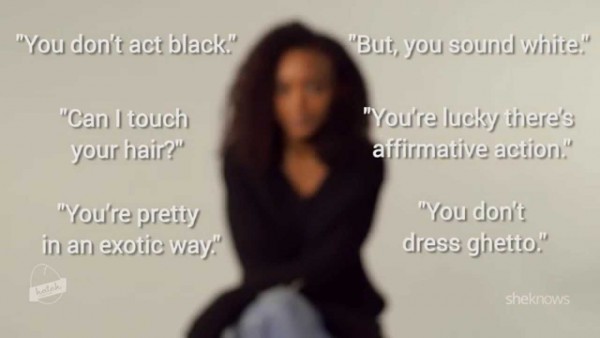Two years ago I proposed, then moderated a panel at WisCon called “Speak To Me In Your Native Language!” And Other Things You Should Never Say To Anyone (clicky for description). The panel title comes directly from something a WisCon-goer said to a friend of mine; and that’s just one of the othering experiences she’s had at the con and why she hasn’t been back in a while. I brought up other examples on the panel having to do with inappropriate touching/moving–of hair, of assistive devices such as wheelchairs–inappropriate interrogation–“You’re not blind, so why do you need a service dog?”–and similar instances of Othering1. I created this panel because I wanted to try and figure out how WisCon and the community of people in it should address the problem and maybe even strive toward fixing it.
The panel didn’t go completely to plan because we got derailed several times by one of the panelists2. I also don’t remember us coming up with any actionable solutions.
The most obvious one for me is to be that person that calls folks out when I witness such situations and encourage others to do so as well. That’s only workable so long as there are people willing and around. You can’t be everywhere. And while that could eventually grow and grow into awareness for everyone, that could take time. And while that’s happening some people still won’t feel welcome at the con.
What didn’t occur to me is that WisCon the organization could do something to address this behavior3. As of this year, we are.
The Safety chairs made it clear that con goers should, if they felt comfortable doing so, report such behavior (labeled microaggressions4 ) to Safety, and that the on duty staff as well as appropriate department or con chairs would take steps to address the problem with the involved parties. That could mean having a discussion with someone about their inappropriate words/behavior and giving them guidelines around further contact with the person who filed the complaint (such as: do not approach them again), as happened this year. That’s not the only recourse. The idea is to make WisCon a safer space for everyone, not just some certain kinds of people. To make WisCon the type of con where you are not required to let things roll off your back and ignore or laugh off microaggressions and othering so you don’t disrupt everyone else’s good time5.
I never realized until recently that there could be an official response to these kinds of actions. Or even what that response would look like.
I know that going forward I’m going to have to fight my own impulses to shrug off such behavior and only share and get understanding over how much it sucks from friends and fellow POC. For so long that was the only recourse I had–well, that and talking about it on the Internet. I got used to that being the status quo. I’m grateful others shattered the status quo.
I’m also glad that as a community we’re more and more giving the signal that addressing Othering and Microagressions is a community effort, not just an individual one. At WisCon, Debbie Notkin noted that when she was young, individuals (mostly girls and women) were expected to deal with sexual harassment on their own. That it was your job to remove yourself from that person, your job to find friends who could help you, your job to be on the lookout and not get in their sights again. Now folks take the stance that it’s the responsibility of the community as a whole to deal with harassers. By actively removing harassers from our community spaces, by identifying harassing behavior and making it clear it won’t be tolerated, by ensuring that people can safely report harassers and feel supported when they do.
As a community, can we make it clear that othering is not okay? That microagressions are not appropriate? Can we make it our problem to address as a community and not only a burden individuals have to deal with? Can we agree that allowing this crap to drive people away (and it does) is untenable?
Can we, community?
Footnotes
- Othering is viewing or treating a person as intrinsically different from and alien to oneself. Doing so allows you to say or ask completely inappropriate stuff that you would never if you saw that person as fully human as yourself. Here’s a deeper breakdown. [⇧]
- He kept saying things like: “You just need to let things like that roll off your back.” and “I don’t see how getting angry does anyone any good.” These can be valid strategies for getting along in the wider world, but were counterproductive in the context of the panel and the con itself. [⇧]
- It should have. That it didn’t has a lot to do with the organization’s reluctance to move on certain things in the past. [⇧]
- the top image is from this vid on microaggressions. [⇧]
- I should also note that the Safety folks at Arisia are doing something similar and have been proactive in addressing this problem at their con. [⇧]


